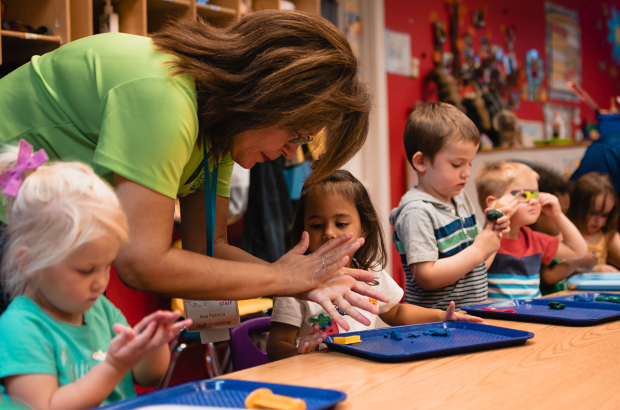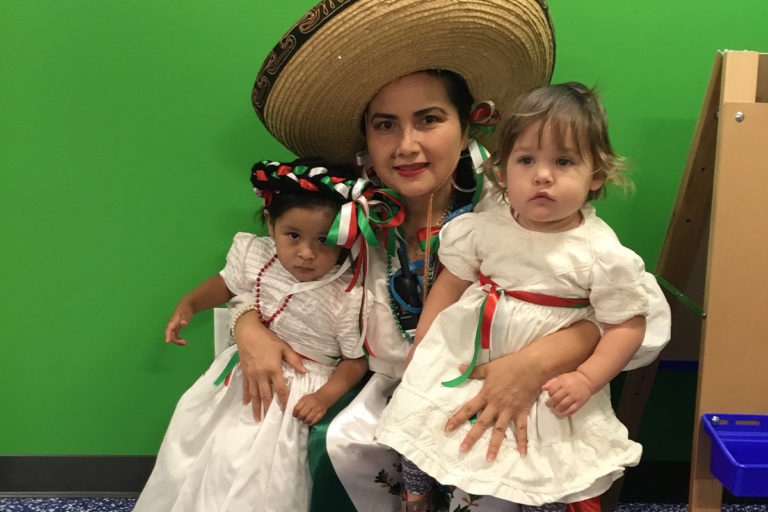The Importance of Early Childhood Education

Early childhood education (ECE) is the curriculum designed to teach kids from birth to ten years old. ECE programs like ours take advantage of the huge developmental potential of early childhood. Founder and CEO of Casa, Natalie Standridge says, “A high-quality ECE program goes beyond basic care; it fosters an environment that celebrates each child’s unique way of learning. At Casa, we focus on bilingual education and immersive experiences, allowing children to grow up appreciating cultural diversity and learning new languages.” In accredited early learning centers, like Casa de Corazón, ECE means children learn through age-appropriate teaching strategies designed for the foundational brain-building stages.
What is Early Childhood Education?
According to the research, early childhood educational experiences can have positive impact — from better cognition to increased confidence — well into adulthood. It lays the foundation for a child’s lifelong learning, setting them up for future academic and social success. Quality early childhood education helps kids develop language, literacy, thinking skills, self-control and self-reliance – all before they enter kindergarten.
Benefits of Early Childhood Education
The skills children gain from a quality ECE program – cognition, emotional regulation, language skills, confidence – are intertwined. The foundation for future skills is built during early childhood. ECE helps kids gain the building blocks needed for success in their K-12 academic career. They also develop the social and emotional regulation they need to feel happy and stable as they enter school. Early childhood education unites these developmental areas strategically, adding up to holistic well-being.
The Science Behind Early Childhood Education
Harvard reports that early childhood education lays the groundwork for cognitive, social, and emotional skills in the first few years of life, when the brain is growing new neural connections at an extraordinary rate of more than one million per second.

Early learning that addresses emotional, social, cognitive, and language development at once prepares children for success in school, in the workplace and in their communities. This developmental window comes once in a lifetime. At Casa de Corazón, we believe all kids deserve high-quality early childhood education that works for them.
Common Misconceptions of Early Childhood Education
“It’s Just Daycare”
Early childhood education is decidedly not just daycare: While a good babysitter may be fun and loving, an early childhood educator is an expert in an interdisciplinary field. Early education specialist Dr. Sarah Baray says, “Early learning teachers have deep knowledge of how children develop physically, emotionally, socially, and academically. And they use this knowledge not only to create an engaging classroom environment, but also to continuously individualize instruction for each. They are among the most highly skilled educators in the teacher workforce.” ECE teachers use science-based measures to improve developmental outcomes and can adapt to each child’s unique needs.
“Play-Based Learning Isn’t Effective”
Play is an important element of early learning. ECE uses a variety of strategies, including educational play, to help kids learn. It is a common misconception that play and learning are at odds. Contemporary Issue in Early Childhood explains that early childhood educators see learning and development as an outcome of play and exploration. A creative environment and stimulation of a child’s imagination is actually what leads to brain development. ECE uses play in the curriculum and enrichment activities to help kids develop key building block skills through play.
“Young Children Don’t Learn Much”
Research tells us that the opposite is true: Early childhood is the window in which the most learning occurs. American Academy of Pediatrics says, “Children’s early experiences are all educational.” Learning happens at home, with extended family and friends and in early education. These early learning experiences impact the architecture of the child’s brain, establishing a foundation for all development to come.
Core Elements of a Quality Early Childhood Education Program
Quality early childhood education programs are accredited and research backed. They balance focused curriculum with free play. A good early childhood education program addresses these four main developmental areas:
Language and Literacy Development: ECE builds communication and reading skills to establish strong language foundations. Bilingual programs, like ours at Casa, are proven to increase cognitive development in children and literacy skills in both languages over the course of their education.
Physical Development: Children learn basic motor skills in ECE, helping them become more self-sufficient and empowering them to reach the benchmarks of healthy physical development. A center with a quality food program, like Casa’s, encourages healthy eating habits early in life, too.
Social-Emotional Development Early childhood education encourages emotional regulation. Exposure to structured, nurturing environments with other kids helps children develop essential skills like empathy, problem-solving, and resilience.
Confidence and Independence: These developmental advantages mean that children in ECE feel a sense of self-confidence from an early age. Being celebrated for their growth by trusted adults helps kids feel assured, stable, and able to self-regulate. Bilingualism, especially when attained in early childhood, is proven to result in higher levels of self-confidence and social ease in adolescence.
Why is Early Childhood Education Important for All?
Family Engagement in Early Childhood Education
Young children require stable, caring, and interactive relationships with adults for healthy brain development. At Casa de Corazón, we prioritize interactions between children and their caregivers, both parents and teachers, as foundational to cognitive development – boosting language, learning, and social skills. At Casa, we emphasize the role of parents as partners in early education. At-home learning experiences are an important part of Casa’s dual language program. Trusted adult-child relationships both at home and at the center are the priority for the ECE model.
Early Childhood Education Policy
The research is clear: high-quality early education and childcare for young children can result in enhanced school readiness and many other long-term benefits. More broadly, quality early childhood education has a positive effect on the entire community. Quality early childhood education reduces repetition and drop-out rates while increasing school retention. It is a major factor in sustainable economic and social development — especially in the creation of a skilled workforce. UNESCO says, “When children are healthy, safe, and learning well in their early years, they are better able to reach their full developmental potential as adults and participate effectively in economic, social, and civic life. Providing ECE is regarded as a means of promoting equity and social justice, inclusive economic growth, and advancing sustainable development.”
Advocate for Early Childhood Education
Early childhood education is a concern for all of us: children, parents, teachers, employers, and neighbors. Truly meeting our children’s developmental needs will require active participation in and championing of early childhood education for all. At Casa de Corazón, we advocate for accessible, high-quality ECE by working closely with families and local communities to promote awareness about its benefits. We believe every child deserves a rich educational start, and we encourage others to advocate for ECE— whether through volunteering, supporting local policies for ECE funding, or simply spreading the word. The National Association for the Education of Young Children (NAEYC), the body which accredits our curriculum, encourages everyone to get involved in the movement for increased investment in high-quality early learning.

